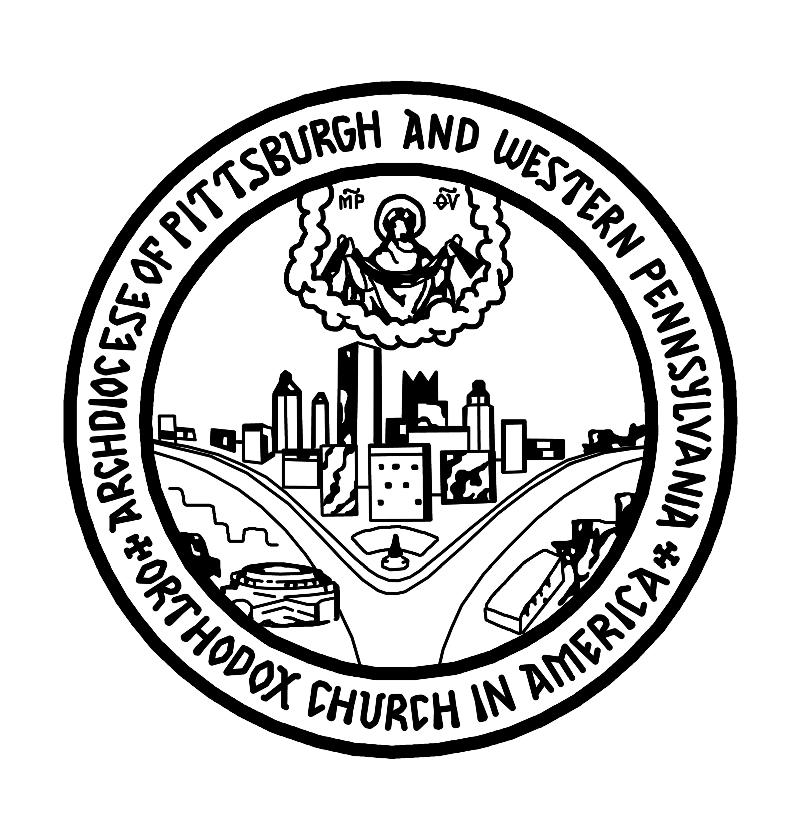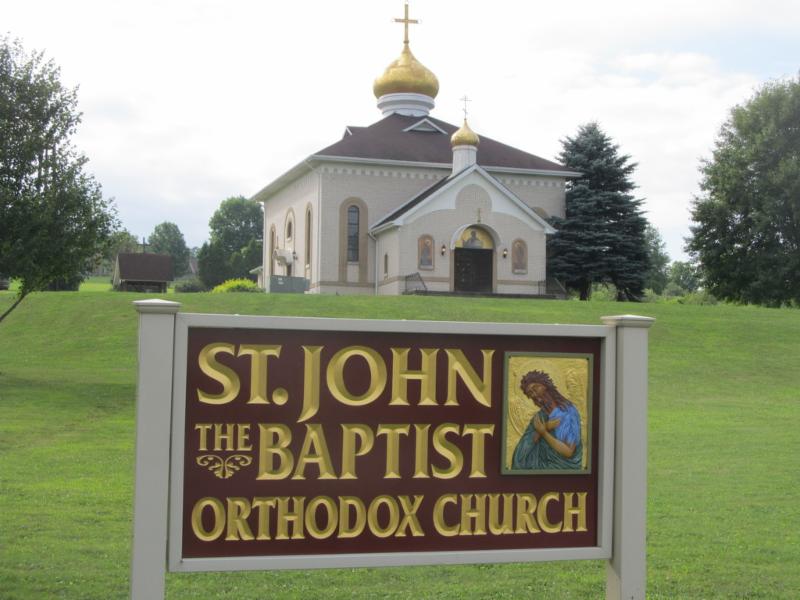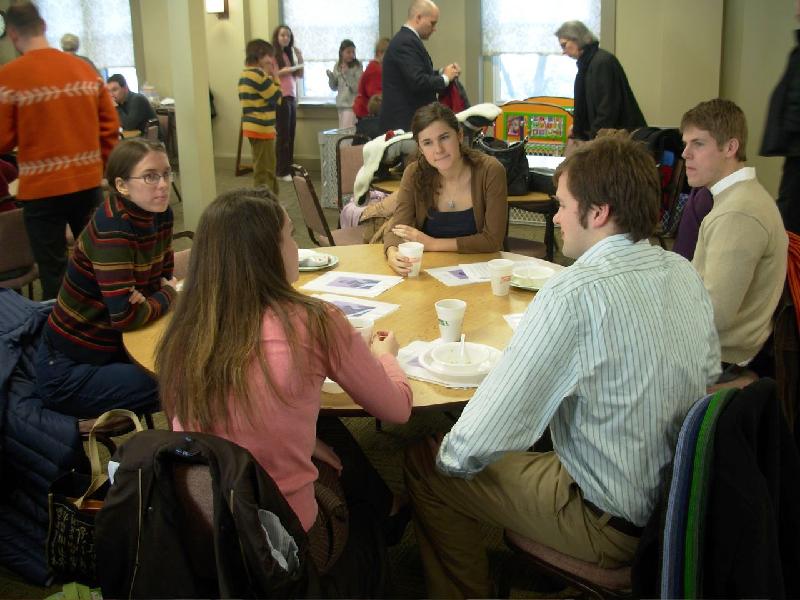|
|
Parish Pulse
 A Newsletter for Parish Leaders A Newsletter for Parish Leaders
Archdiocese of Pittsburgh and Western Pennsylvania
Orthodox Church in America
August, 2015 - Vol 3, Issue 3
|
|
|
|
|
 |
|
In Christ,
Joe Kormos
Parish Development Ministry Leader Archdiocese of Western Pennsylvania
|
 | Leaders Day October 3.
10:30 AM - 2:30 PM St. John the Baptist Church Hall Black Lick PA
|  The third annual Archdiocesan Leaders Day will be held on October 3 from 10:30 AM to 2:30 PM at the St. John the Baptist parish hall 128 Seymore St, Black Lick PA 15716.
To download the flyer for your parish bulletin board click here.
While past Leaders Day programs provided opportunity for questions and discussion they were dominated by topical presentations. This year we will move away from a "training format" to a (half) day oriented to dialogue and structured whole group and small group discussion about critical parish life issues.
Titled "Facing Forward: Helping Parishes Face the Future" we expect the following to be among our topics:
1. Reclaiming our parish future. What kind of parish do we want to become? What is a "viable" parish? Do we have to be "large"? Can small be vibrant?
2. Breaking our insularity Can we establish a clear Christian identity in our town? Can we learn to invite people to church? How can worship be more inviting? Can we focus efforts outside our walls? Who needs our help? Who would come to our parish? What would they find attractive?
3. Rebuilding from within. People leave our parishes for other faiths -or lives of weekend relaxation or unbelief? Can we close the 'back door'? What might we be doing to keep our parish from growing? Without a priest - or with a priest who is ill or working one or more secular jobs - how can the leaders of small parishes improve the situation?
As always this event is for clergy and lay leaders from throughout the Archdiocese.We will make a special effort to make the session relevant for attendees from Altoona/ Johnstown deanery parishes.
If you have a topic to be explored --let us know. |

|
Five Things to Ask A Young Adult Who Walks Into Your Church
|
In February we offered a webinar titled "Waking UP Your Parish with College Ministry" (Slides can be found here. Archive recording here.) As a follow up we asked Andrew Boyd leader of the OCA's Department of Youth and Young Adult Ministries, for tips about having a natural conversation with college students that visit a parish. Something beyond "where are you from" and "what are you studying?" Andrew's suggestions follow:
1. What's different? Even just within the OCA and within specific dioceses and deaneries, there is a huge amount of diversity in the "little t" traditions that make up the praxis of our faith. Gently asking about or highlighting what's different about your particular parish serves several purposes, inviting you to open up about your history with the community, putting new people at ease, and inviting them to share about their previous parish experiences. "Did you notice we sing 'Having Beheld the Resurrection of Christ...' here after communion? I like that tradition because..."
2. How are things?
Ask it, and mean it. Don't settle for the canned and polite responses we all use. "It's fine, I'm good" and polite ways of saying, "I know you don't really care." Ask it, wait for the canned response, and then keep silent. and wait to see what the person says. It takes some practice and discipline, but this little trick is a foundation to basic listening and pastoral skills. "love delivered".
 3. Why are you here? 3. Why are you here?
A parish I went to in college used featured an older woman who would stand by the door of the church and ask that question in an accusatory way, ensuring that "outsiders" remained physically outside.
Let's re-purpose her question to gently lead to a more reflective discussion as to why you and I remain involved in the Church as adults, and why the young adult who walks through our door does also. This can lead to him/her expressing how they have been involved in the Church in the past, which can help us suggest ways for them to "plug-in" to this new parish situation.
4. How did you find us?
A good way to gauge how your parish is "marketing" itself in the community is simply to ask, "How did you find us?". Specific answers can guide future decisions on where your parish in investing its time and money. An answer like "I found you the on OCA website, but I had a hard time finding your parish page through google," might suggest that you need to be thinking about SEO on your parish website more. It also reveals information about the person who answered, about how they think and what resources they use to engage their faith.
5.Nothing at all.
Don't feel a strong need to ask anything in particular. All of my business school sales training told me that people love talking about themselves. Give them the space and the patience to let them do that, it will automatically make them feel warm, welcomed, and part of a caring community.
|
|
|
|
|
|
|
|
On vacation in Florida we found the only Orthodox parish within a 45 mile radius. Our experience: -
|
| | Welcome? or Not? Some might doubt it? |
The parish website was four years out of date. "Epistle for this Sunday August 12, 2011 will be..." It was Feb. 2015.
- The website contained numerous insider references. Nothing about "welcome visitors". This is FLORIDA!
- An email to the priest (two weeks in advance) inquiring if the parish was still in existence, service times and could we receive communion received no reply.
- We phoned the Saturday before and left a message with the same questions. The reply came 40 minutes before church on Sunday. We were assured we'd be welcome.
- We looked for the parish location on Google maps. There were two different dots. We guessed right.
- The small sign outside, prominently displayed an ethnic label and announced their upcoming ethnic food festival.
- The celebrant's portion of the liturgy was in English -- but chanters responded in a foreign language. Yes, we knew what they were singing. But no, we couldn't participate.
- The Gospel ("Sunday of Last Judgment") referred to caring for prisoners. It was later noted something to the effect that "our parish community has no prisoners" -- so only peripheral applicability.
- During announcements a seemingly obscure village custom associated with the first week of lent was mentioned. "Does anybody trace to a village with this custom?"
Best of all the sermon, which was actually quite well done, referred in part to a recent study in which non -Orthodox were asked their impression of Orthodox people. The priest reported that the two most cited qualities were that Orthodox are:
1. Known for food 2. Seen by others as "clannish". Interestingly, our sense was that the parishioners found these results rather surprising.
Clannish? Why would people think that?
What can we learn here? It is hard for us as Orthodox to appreciate when we are talking and presenting ourselves to others in a way that breeds and communicates "insularity" |

|
Miscellany
Parish Development Tidbits
|
 Planning Planning"There is a limit to the energy available to devote to planning, in any organization-not just churches. Few churches need and are capable of an extended and exhaustive planning process. Churches do, however, need to structure ways to talk about their identity, purpose, and future, and they need a path to develop their commitments to act together. The product of a planning initiative is not necessarily a written plan. It's important product is a conversation that changes a parish, whether it results in a written document or a less formal set of agreements. It's not the plan, it's the conversation." Unknown source

Avoid Premature Consensus
"Groups, especially church groups, often move to premature consensus on a solution. It happens this way: A problem or issue is identified. The first person to speak offers a reasonable course of action. People nod agreement, and the issue is settled. Such a practice fails to capitalize on the wisdom present in others who, given time, might come up with an even better answer.
"A leader can keep the conversation going with this response: 'Thank you for that idea. What other options are there? Let's see if we can identify at least two more before we discuss them.'"
Lewis Center for Church Leadership
Possessions
"A possession ought to belong to the possessors, not the possessor to the possession. Whosoever, therefore, does not use his patrimony as a possession, who does not know how to give and distribute to the poor, he is the servant of his wealth, not its master; because like a servant, he watches over the wealth of another and not like a master does he use it of his own. Hence, in a disposition of this kind, we say that the man belongs to his riches, not the riches to the man."
St Ambrose of Milan.

Stewardship Methods
"Lead and act from your strength. For a majority of your members giving to their church remains the top priority in all charitable giving."
"Don't frame your planning and communication in anxiety and guilt. Most stewardship pleas sound like people ('boards') are scared."
The Lake Institute on Faith and Giving
78% Would Enjoy Conversation About Beliefs
"78 percent of adults 30 years and older said they would enjoy an honest conversation with a friend about religious and spiritual beliefs, even if they disagreed with the friend.'
Lifeway Research -- Study of 1402 unchurched adults
|

| When Parishes Close Themselves
|
When working with parishes we often ask "How long do you want your parish to live?" The reply is always the same. "Forever". Sometimes robust -- sometimes tentative. (Though one honest woman admitted her horizon of concern was only until "after I die!") Often someone brings up the topic of closing or consolidating parishes. While our agenda is focused on helping parishes survive and thrive, some churches may eventually close themselves -- having run out of people, money or both. (Given that many experts have predicted that, for example, the Anglican Church in Canada is one generation from extinction, this is not a commentary about any particular Orthodox jurisdiction, Diocese or parish.) Which will live and which will not? Based on visits to now 82 Orthodox parishes in seven years, below are a few characteristics of parishes that will likely close themselves and corresponding behaviors of parishes facing a long productive future.
Characteristics of Parishes That Are Closing Themselves
More memories than vision.
Fading parishes are experts at freeze framing -- more focused on preservation than expansion.
Trying to recapture what they had been 20-40 years before, they seemingly lack perspective of what is going on in the world around them. They have no destination.
|
| | Fading Parishes are in severe ruts. Paved in yesteryear. |
Timid singing and worship.
Other descriptors would be tired, lethargic, tepid, listless. Not joyful and vibrant. Even mediocre singing can be joyful with a bit of energy and gusto. Listless worship does not attract people.
Lack of eye contact and informal smiles.
It often starts at the candle desk. This is a greeting ministry not a customs station. Smile and say "welcome". It continues into the nave before, during and after Liturgy. Averted gazes. Making guests feel invisible as we walk past to chat with friends.
Inferiority Complex.
The general lack of joy seems to manifest itself in what some church consultants describe as "weak capability belief". "We're too small"; "too poor"; "too busy"; "too old"; "too spread out". Nobody expresses it directly but the sense is: "We're only Orthodox. Don't expect much from us." Generations earlier parish founders overcame more significant obstacles.
Money is a fearful topic.
Shiny vehicles and attractive homes are hallmarks of the parishioners, yet when considering the church's needs a pauper's mentality prevails. Establishing a parish that will live into the future requires commitment and sacrifice not living off the efforts of ancestors.
Disrepair
The mentality of scarcity manifests itself in neglected buildings and grounds, chipped paint, shaggy grass/landscaping, worn carpet, faded signs, dust and disarray. Instead of strengthening the parish for future generations,the budget (if there is one) is balanced on the backs of future generations through deferred maintenance.
Characteristics of Parishes That Are Renewing Themselves
Those parishes with a solid future seem to exhibit many of the following characteristics:  Warm Fellowship Warm Fellowship
Christ is in their midst. People smile and hug. Cross generational relationships help to bond younger persons, no matter how few, to the parish. Laughter. Eye contact and a smile for guests. Invite Others Been to a great restaurant recently? If so your first response was likely to share the Good News with your friends. In parishes that 'have it goin on' people have invited friends. Picked them to come to church with them. Focus on Possibilities and Taking Risks In parishes that face forward everything is not rosy --but leaders work to stay ahead of problems. They ask, "What would it take? What are we NOT doing well? Why can't we? If we had an additional $25K/year what could we do to build up this parish? To spread the Word? To some this sounds like a boring planning effort. In actuality its a dialogue --a good conversation. When such dialogue occurs people say, "Gosh we haven't talked about these topics in years!" Community/Neighborhood Ministry The parish has somehow overcome the gravitational pull to be self focused. By being willing to engage in future oriented topics they see limitations in their mission and learn to look beyond themselves to connect with community. Not as a growth/promotion program. Growing parishes get to work --despite the fact that parishioners usually live elsewhere. Men NOT Missing The stereotype is that mostly women attend church. Yet in blossoming Orthodox parishes there seem to be a higher percentage of male worshipers than in fading parishes. In a few cases we've noticed more men than women. There are many possible explanations for this and we don't know which is the cause or the effect. We've lost the reference, but we recently read that a high percentage of adult men correlates with an ability to attract and retain young adults in a church. If true what are the reasons? |
As always we appreciate the opportunity to land on your desktop or mobile device. We hope you can take some encouragement and fresh ideas from the topics presented.
Please let us know of other topics that would be relevant to you.
In Christ,
Joseph Kormos
Archdiocese of Western Pennsylvania, Orthodox Church in America
joekormos1@gmail.com
513-683-1911
|
|
|
|
|
|
|